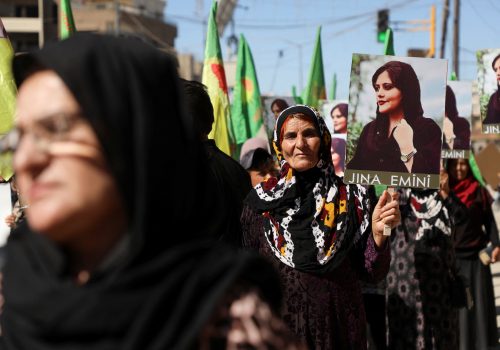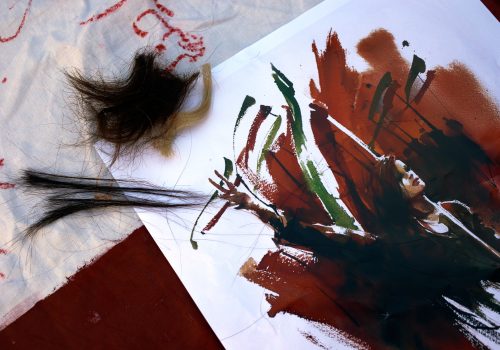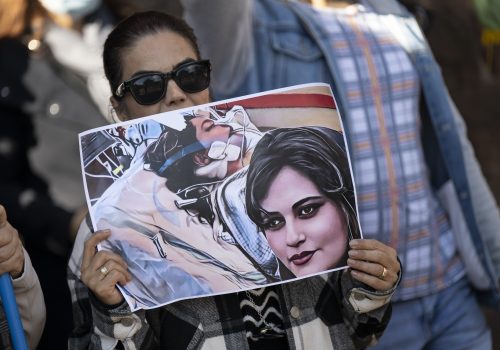I’m a former Syrian civil society activist. Syrians can’t tell Iranians how to win, but we can share lessons we learned the hard way.
This is based on the author’s Twitter thread. It is reprinted here with permission.
In my previous life, I was a civil society activist and strategist. I invested a long time studying the literature of protest movements. For most of the last decade, I was part of the Syrian Nonviolence Movement, where I had the honor to work alongside inspiring activists and learn from and with them. I have some thoughts to share with my Iranian friends. Syrians can’t tell you how to win, but we can share lessons we learned the hard way.
- Keep in mind you are in a marathon, not a sprint. This means your path is much longer and more complex than you might expect. It also means your path has much more potential than you think. Your journey will change not only your relationship with your government and society but also your understanding of yourself, your values, and your purpose.
- Long-term planning is vital. You are not the strongest player—your only chance to survive is by being the smartest and the fastest. Strategizing is way more important than protesting. You do not need to protest to survive, but you definitely need to strategize.
- Build your own civil society think tanks. Create strategy groups to analyze the present, think of the future, and provide recommendations for various grassroots initiatives. Consider this question: what are the possible scenarios for how things could evolve in Iran? What are worst-case scenarios? For the exercise, be as pessimistic as possible and plan accordingly. Remember, you cannot avoid what you cannot see.
- Discuss what you want among yourselves—not only what you do not. Keep an open mind and let the debate thrive. Popular protests are coalitions of different groups with a shared enemy: how much do different groups of your coalition have in common? What do we agree and disagree on? How should we work on those differences? How is the regime working on them? How could they become weaknesses, and how can we make them strengths?
- Look inward and critique yourself. The more internal criticism a movement practices, the better its survival chances get. The more you analyze yourself, the stronger you can become. Find your weaknesses before the regime finds them. It is a matter of time. Remember, you must be the fastest.
- Do not overlook mistakes or wrongdoings by protestors, and never cover them up. Many movements lose their moral high ground when they say, “We will get to that later; let’s focus now on the shared enemy.” Focus on yourself first and foremost. Do not put on hold being who you want to be.
- Do not fall into the trap of “Iran is different.” It is not. While every case is unique in many ways, movements have more in common than what appears on the surface. Learn from others. “We are different” is a statement almost every country says. Just like physics, there are laws that apply to protests, change, and power dynamics, from Nicaragua, Serbia, Iraq, and South Africa to Hong Kong. Learn from their mistakes, build on their successes, and keep in touch with other activists from around the world to share lessons learned.
- In such big moments of history, things tend to get very ugly and heartbreaking. There is so much going on, and it could spiral out of everyone’s control. Leaders of civil society should prepare for that. What is our plan B? Are we focusing so much on winning that we are not preparing for other scenarios? What will we do if this wave totally fades out? What will we do if the regime intensifies its brutality? Are there signs that some protestors might resort to violence? How do we prevent that? How can we solidify our current gains and build on them?
- Document violence and violations—small and big—by everyone. Do not give passes to anyone. You own your uprising. Your uprising soon will try to own you. Do not let it. Stay in control, stay in charge, and change course whenever needed—no matter how painful. Remember, the goal is not the uprising but to bring about a positive change. Protesting is a tool. What other tools can you use today and tomorrow?
- Face the grey area dilemma, which is the issue of the silent majority and those who were regime sympathizers. Be as inclusive as possible, encourage people to change, and welcome them. Let people be part of the change. Never alienate anyone, and never shut the door. Do not issue permits for who can say what, and do not censor anyone. Be the Iran you want to see.
- There is a role for everyone, and you do need everyone. Protestors, thinkers, diaspora, artists, and business leaders. Accept that not everyone has the same capacity. Find ways to organize your supporters, activate the silent ones, and deactivate the passion of the government supporters. Create ways for people to join based on the level of risk they are willing to take and what their lifestyle allows them to do. This will also help you sustain the movement for the long term.
- Empower leadership to emerge from within and unite around common symbols. Movements that form under authoritarianism often struggle with creating trusted leadership. Hold your leaders accountable but also allow them to learn and improve.
- Be kind to each other. Allow people to be the best version of themselves. You only have each other. Have each other’s backs and give each other the benefit of the doubt. Activists become hostile towards each other because of stress and heightened emotions. Your counterparts are the change; without them, there is no movement. It is all about the people.
- Take care of your mental health. I cannot stress this enough. If you have access to therapy, it is a priority. Create access for others. Do not romanticize pain. Create groups for people to talk and support each other emotionally. This is something for Iranians inside and outside Iran. If you feel overwhelmed, take a breath and allow yourself the time you need before you start running again.
These are some thoughts that might be helpful to someone somewhere inside or outside Iran. Take what you think is useful. The people of Iran are on the minds of so many people in the region and around the world that you have never met. They wish for your safety and for a peaceful and prosperous Iran that you, the region, and the world need. Martin Luther King once said, “Faith is taking the first step, even when you do not see the whole staircase.” Your faith in a better future is a source of inspiration to all of us. May we all live in peace, dignity, and equality.
Ibrahim Al-Assil is a senior fellow at the Middle East Institute in Washington, DC. A founding member of the Syrian Nonviolence Movement in 2011, he served as its president between 2012 and 2016. Follow him on Twitter: @ibrahimalassil
Further reading
Mon, Sep 26, 2022
‘Women, life, liberty’: Iran’s future is female
IranSource By
Women, young and old, have been at the forefront of the uprising, just like every other protest in Iran over the past decades.
Thu, Oct 13, 2022
By killing Mahsa Amini, the Islamic Republic has created millions of Medeas
IranSource By
Iran’s oblivious aging rulers have, like Jason, gone too far. Now they must face a million Medeas with no thought of forgiving and determined to have their revenge.
Tue, Sep 27, 2022
How to turn Iran’s moment into a movement
IranSource By Borzou Daragahi
In Iran, the momentum is there. It just needs direction and a helping hand.
Image: FILE PHOTO: People take part in a protest against the Islamic regime of Iran following the death of Mahsa Amini, in Istanbul, Turkey December 10, 2022. REUTERS/Dilara Senkaya/File Photo


